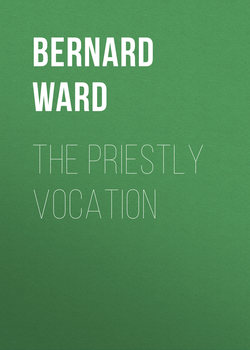The Priestly Vocation

Реклама. ООО «ЛитРес», ИНН: 7719571260.
Оглавление
Bernard Ward. The Priestly Vocation
PREFACE
THE PRIESTLY VOCATION
CONFERENCE I
CONFERENCE II
CONFERENCE III
CONFERENCE IV
CONFERENCE V
APPENDIX ON OBEDIENCE AT THE SEMINARY
CONFERENCE VI. THE RELIGIOUS EXERCISES OF THE PRIEST
CONFERENCE VII. THE PRIEST'S PASTORAL WORK
CONFERENCE VIII. THE PRIEST'S PASTORAL WORK (continued)
CONFERENCE IX. THE PRIEST'S PASTORAL WORK (continued)
CONFERENCE X. THE RECREATIONS OF A PRIEST
CONFERENCE XI. THE RECREATIONS OF A PRIEST
CONFERENCE XII. THE ANNUAL HOLIDAY
CONFERENCE XIII. THE PERIODICAL RETREAT
CONFERENCE XIV. THE PRIEST IN SICKNESS—AND IN DEATH
Отрывок из книги
IT is well known that one of the great aims of Cardinal Manning during his long episcopate, and perhaps the one of his works which has left the most permanent impression behind it, was to raise the tone and status of his diocesan clergy. For many reasons connected with our Catholic history, the level at which the average secular priest in the days of the Vicariates aimed left something to be desired. When we read the story of penal times, and realise the kind of life that an ordinary priest had to live, it is not surprising that the tone and quality of mind which we somewhat vaguely designate under the name of the "Ecclesiastical spirit," should not have been largely developed.
We are not speaking now of the time of actual persecution. In the days when a priest had to go about his duties in the continual risk of being apprehended and cast into prison, and being condemned on trial to be hanged, drawn and quartered, the heroism of his life, and the manner in which he had to be almost continuously braving personal danger in his search after souls, would undoubtedly have taken the place of much training and prayer in sanctifying his soul. But with the relaxation of active persecution, came an imminent danger which showed itself throughout the dreary eighteenth century, and during the first half of the nineteenth. There was no longer any fear of violence, and even the depressing penal laws invented after the Revolution of 1688 gradually lost their vitality and ceased to be enforced. But the spirit engendered by these laws lasted longer than the laws themselves, and when the English clergy found themselves able to live the normal life of a secular priest, some stimulus was required to revive in them the spirit of their state, which had been so long obscured by the necessity of hiding their priesthood.
.....
"Fifthly, self-accusation at our own unprofitableness, from the generosity and fidelity of those who are hindered on every side, and yet in humility, self-denial, charity and union with God surpass us, who have every gift of time and grace needed for perfection."
A similar effect is produced in us by the ordinary visitation of our people, even in the most difficult surroundings. How many do we not come across whose daily uphill struggle for virtue puts our own lives to shame! Others whose trust in God in apparently hopeless circumstances, and the answers which we see to their prayers, bring the closeness of God's providence over His elect sensibly nearer to us. Then our prayer with our people and for our people, our instructions and sermons, our indirect influence over them, all alike continually keep us in the presence of God. There is a tendency among some priests to look upon the devotions in which they lead their people as one thing, and their own spiritual exercises—their Office, Meditation, Spiritual Reading—as another. There is no need for any such distinction. The devotions which a priest goes through with his people—the Rosary, confraternity prayers, Benediction and the like— react on his spiritual life quite as strongly as his Meditation or Spiritual Reading which he may have omitted in their favour. The Cure of Ars for many years practically gave up his private spiritual exercises, except his mass, in order to devote the whole of his time to his pastoral work, either in the Confessional, or in the midst of his people, preaching to them, or saying night prayers or other devotions with them. In his later years he was dispensed by Rome even from saying his Office. His was indeed an extreme case; but the same principles hold good, in their measure, in the case of every priest who devotes himself to his pastoral work. Even the sin and misery which we see around us, bring vividly before us the dignity of our own office in trying to rescue our people from the results of their own folly. Still more when we minister at the death either of one who has led a good Christian life, or one who has become a true penitent, are we brought almost into touch with the other world. There is a sacredness about a Catholic death-bed which is all its own. One moment the patient is going through the last of his sufferings in this world, dependent upon our poor help and our prayers, and receiving the consolations of religion at our hands: a moment later he is in the other world, looking down on us, with knowledge and experience which we so long to have, his salvation we hope assured, and this the result of our ministry. Can any priest come back from a Catholic death-bed without a feeling of awe, and his faith strengthened as though he were in actual contact with the next world?
.....